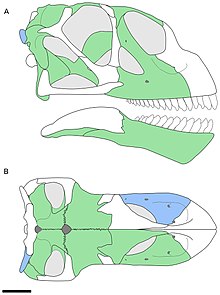Bellusaurus (meaning "Beautiful lizard", from Vulgar Latin bellus 'beautiful' (masculine form) and Ancient Greek sauros 'lizard') was a small short-necked sauropod dinosaur from the Late Jurassic (Oxfordian)[1] which measured about 4.8 metres (16 ft) long. Its fossils were found in Shishugou Formation rocks in the northeastern Junggar Basin in China.
| Bellusaurus Temporal range: Oxfordian,
| |
|---|---|

| |
| Skull reconstruction | |
| Scientific classification | |
| Domain: | Eukaryota |
| Kingdom: | Animalia |
| Phylum: | Chordata |
| Clade: | Dinosauria |
| Clade: | Saurischia |
| Clade: | †Sauropodomorpha |
| Clade: | †Sauropoda |
| Clade: | †Eusauropoda |
| Genus: | †Bellusaurus Dong, 1990 |
| Species: | †B. sui
|
| Binomial name | |
| †Bellusaurus sui Dong, 1990
| |
Discovery and naming
editThe type and only known species is Bellusaurus sui, formally described by Dong Zhiming in 1991. The remains of Bellusaurus were found in the Shishugou Formation in the northeastern Junggar Basin in China. Seventeen individuals were found in a single quarry, suggesting that a herd had been killed in a flash flood. Some features suggest they may have all been juveniles.[2] Bellusaurus sui was derived from the Latin bellus meaning small, delicate, and beautiful, as these sauropods were small and lightly built. The specific name, sui, was named in honor of Senior Preparator Youling Sui, a notable restorer of dinosaur remains. Bellusaurus was the last restoration undertaken by Mr. Sui.[2]
Fossil record
editBellusaurus sui is known from a large amount of disarticulated material of juvenile individuals.[1][3]
Description
editThe length of Bellusaurus has been estimated to be 4.8 metres (16 ft),[4] although this is based on juvenile individuals.
Classification
editBellusaurus was originally placed in the Brachiosauridae by Dong.[2] More recent phylogenetic analyses have recovered Bellusaurus outside Neosauropoda or near the base of Macronaria.[1] In 2023, a study proposed that Bellusaurus is a mamenchisaurid.[5]
References
edit- ^ a b c Moore, Andrew J.; Mo, Jinyou; Clark, James M.; Xu, Xing (2018-06-01). "Cranial anatomy of Bellusaurus sui (Dinosauria: Eusauropoda) from the Middle-Late Jurassic Shishugou Formation of northwest China and a review of sauropod cranial ontogeny". PeerJ. 6: e4881. doi:10.7717/peerj.4881. ISSN 2167-8359. PMC 5985764. PMID 29868283.
- ^ a b c Dong, Z. M. (1990). "On remains of the Sauropods from Kelamaili region, Junggar Basin, Xinjiang, China" (PDF). Vertebrata PalAsiatica. 28 (1): 43–58.
- ^ Mo, Jinyou; Xu, Xing (2013). Bellusaurus sui. Topics in Chinese Dinosaur Paleontology. Zhengzhou: Henan Science and Technology Press. ISBN 978-7-5349-6521-0.
- ^ Dong Zhiming (1992). Dinosaurian Faunas of China. China Ocean Press, Beijing. ISBN 3-540-52084-8.
- ^ Moore, Andrew J.; Barrett, Paul M.; Upchurch, Paul; Liao, Chun-Chi; Ye, Yong; Hao, Baoqiao; Xu, Xing (2023-03-15). "Re-assessment of the Late Jurassic eusauropod Mamenchisaurus sinocanadorum Russell and Zheng, 1993, and the evolution of exceptionally long necks in mamenchisaurids". Journal of Systematic Palaeontology. 21 (1). Bibcode:2023JSPal..2171818M. doi:10.1080/14772019.2023.2171818. ISSN 1477-2019. S2CID 257573094.
External links
edit- Bellusaurus in the Dino Directory